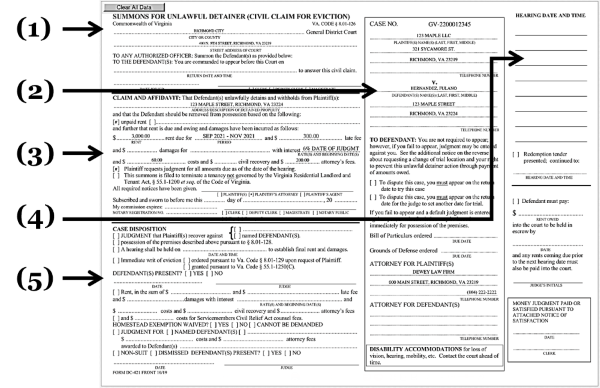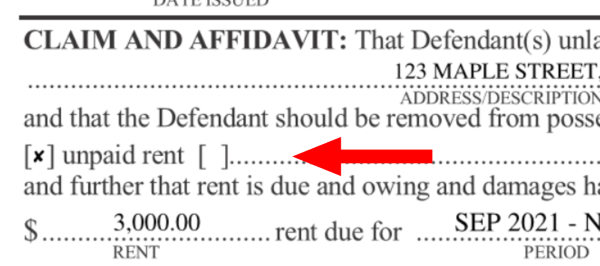What information does it have?
The summons has five main parts.
- Court Information: Tells you which court is handling your case.
- Parties Involved: Shows who is suing and who is being sued.
- The Claim: Explains what the landlord wants and the legal reason why.
- Hearing Date and Time: Tells you when you must go to court.
- Court Decision: The judge fills this out at the court hearing.
Sample notice

What information is important?
If your landlord makes mistakes on the summons, you can ask the judge to throw out the case. Look to see if this important information is correct.
- The name of the plaintiff. If the name they put on the form is not the property owner or is not listed as the landlord on your lease, you can ask the judge to throw out the case when your hearing starts.
- Date and time of the hearing. You have to go to court for the hearing if you want to fight the case.
- Property address. Make sure the correct address is on the first line in the “Claim and Affidavit” section. If it’s the wrong address, ask the judge to throw out the case.
- The legal reason.
What is the legal reason?
Look at the "Claim and Affidavit" section of the form. There are two checkboxes for the landlord to say why they started the case.
- If the landlord marked only the first checkbox, before "unpaid rent,” it means they filed the case only because of unpaid rent.
- If the landlord checked the second box and wrote something on the dotted line, it means they filed for another reason. They might write “holdover” or “expired lease” or “lease violation,” etc.

Why does the reason matter?
You have to know why the landlord is asking the judge to evict you if you want to fight the case in court. Most cases are filed because of unpaid rent. But if the landlord gives the court another reason, you will need to fight the case differently.
Keep in mind
- Your landlord still has to win the case and get the sheriff involved before they can force you out. See all the steps in the process.
- Go to Fight my eviction to learn how you can respond to a court summons.
You may want to talk to a lawyer for specific advice. Contact your local Legal Aid office to see if you qualify for free help.
Take action
Learn what you can do to try to stay in your home and avoid eviction.
Sometimes, you can't avoid eviction if your landlord wants you out. But it is always good to learn how the law can protect you and what you can do about your situation.

